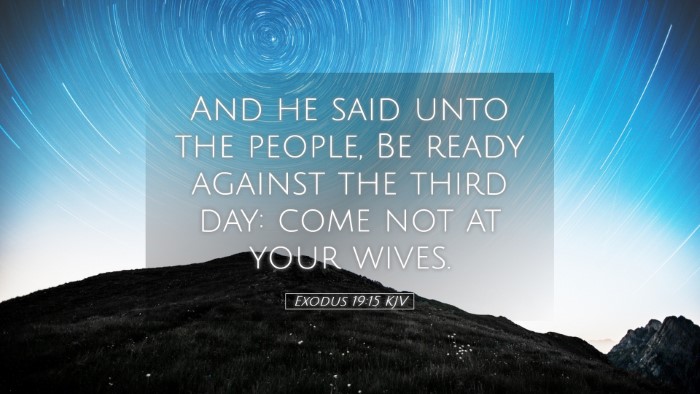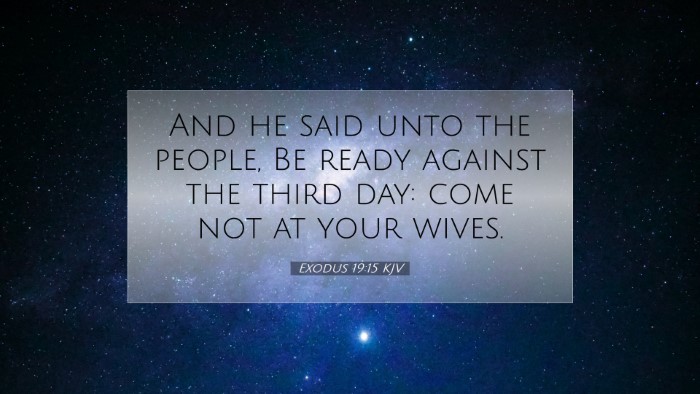Commentary on Exodus 19:15
Exodus 19:15 states: "And he said unto the people, Be ready against the third day: come not at your wives." This verse is a part of a larger narrative in which God prepares His people for a profound encounter with Him at Mount Sinai. This commentary seeks to explore the multifaceted dimensions of this verse, drawing insights from esteemed public domain commentaries by Matthew Henry, Albert Barnes, and Adam Clarke.
Contextual Background
The events leading up to Exodus 19:15 occur after the Israelites' deliverance from Egypt and their journey toward the Promised Land. God is about to reveal His covenant and impart the Ten Commandments, establishing significant moral and ceremonial laws for His people.
The Call to Preparation
-
Matthew Henry emphasizes the importance of preparation before coming into the presence of God. He posits that God calls His people to a state of readiness, indicating that approaching Him requires reverence and dedication.
-
Albert Barnes elaborates on the necessity of readiness, noting how physical and spiritual purification is essential when approaching the Divine. The command to abstain from marital relations signifies a time of focused devotion.
-
Adam Clarke highlights that this preparation is not merely external. He suggests that it reflects a deep internal readiness—one that aligns hearts and minds towards God’s holiness.
Significance of the Third Day
The mention of "the third day" is particularly significant in biblical theology. It has been interpreted in various ways:
-
Matthew Henry interprets the third day as a symbol of the resurrection and hope. It foreshadows the ultimate covenant God establishes through Christ, which reaches its zenith on the third day following His crucifixion.
-
Albert Barnes adds that the third day marks a period of waiting, during which the people could reflect on their unworthiness and the awe of what is to come. This waiting is purposeful and sets the tone for the divine revelation.
-
Adam Clarke connects the significance of the third day to its role in Jewish festivals and observances, noting that several key events in the Scriptures happen on the third day, thus amplifying its thematic relevance.
Separation from Marital Relations
The instruction against coming near to their wives has generated various interpretations and discussions:
-
Matthew Henry discusses the symbolic act of abstaining from marital relations as a design to heighten the peoples' sense of purification and singularity of purpose in seeking God. This act signifies that moments with God should take precedent.
-
Albert Barnes suggests that this directive highlights the seriousness of the encounter with God. By setting aside normal life functions, the people demonstrate their commitment to holiness and elevation to a Divine focus at this momentous event.
-
Adam Clarke takes a pastoral approach by acknowledging the human need for intimacy, yet reinforces that spiritual pursuits must sometimes supersede even legitimate human connections for a time to foster a greater divine interaction.
Theological Implications
This verse contains profound theological implications that resonate throughout Scripture:
-
Covenantal Relationship: The call to be ready underscores the relational dynamics between God and His people. God's desire for a covenant relationship necessitates human effort to align with His holiness.
-
Preparation for Encounter: The preparation not only serves as a directive but encapsulates the essence of holiness and purity required to approach God. It transcends the singular event and becomes foundational for ongoing relationship with God.
-
Foreshadowing Christ: Just as the Israelites prepared for an encounter with God, Christians are reminded of the preparation that comes in light of Christ's work. The themes of readiness and holiness echo throughout the New Testament when approaching God through Jesus.
Conclusion
In conclusion, Exodus 19:15 stands as a compelling verse that intricately weaves together themes of preparation, holiness, and covenant. The insights drawn from Matthew Henry, Albert Barnes, and Adam Clarke not only offer depth to the understanding of this verse but also challenge believers to reflect on their own preparations as they seek God. It serves as a reminder that entering into God’s presence requires intentionality and reverence, urging both pastors and scholars alike to engage with this text in a transformative manner.


